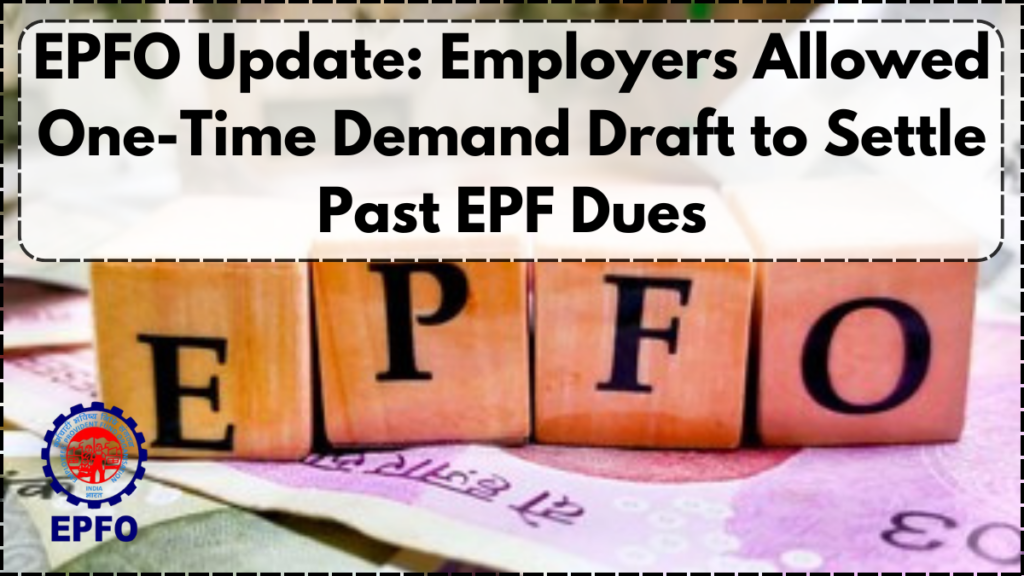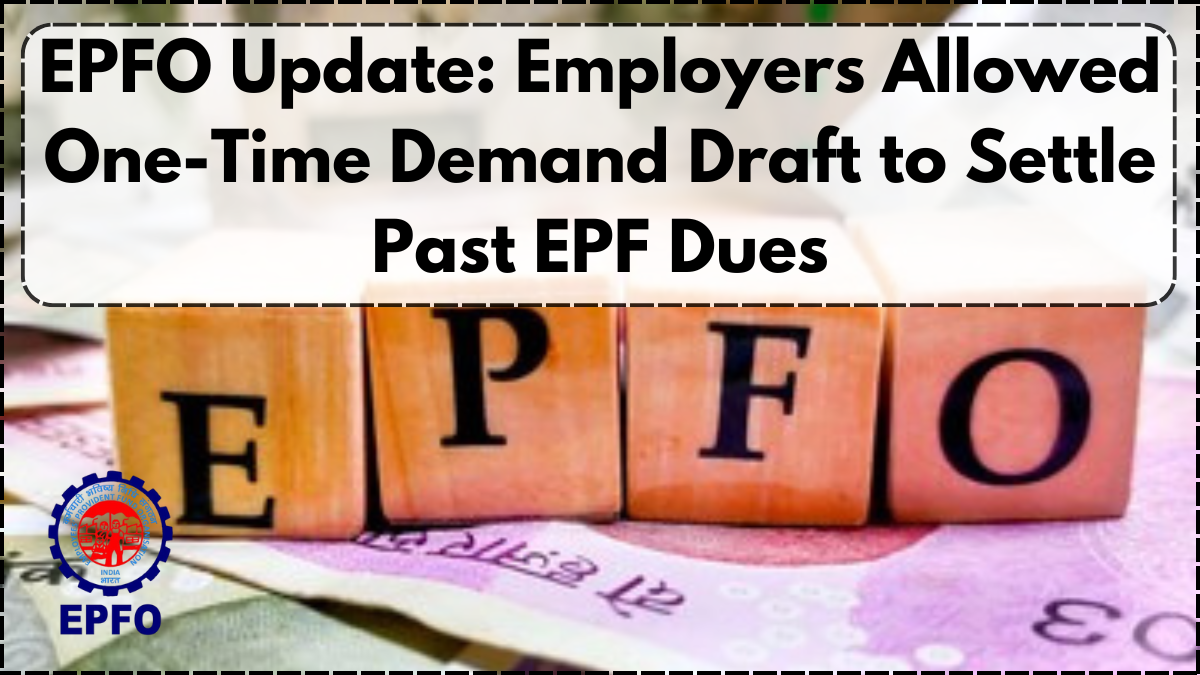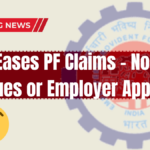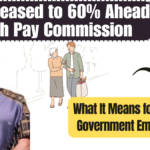The Employees’ Provident Fund Organisation (EPFO) has unveiled an innovative relief initiative to help employers clear long-standing EPF dues. Starting in April 2025, EPFO has introduced an option for employers to make a one-time payment of past dues through demand drafts. This new approach marks a departure from the traditional method of electronic payment, where employers would typically submit the Electronic Challan-cum-Return (ECR) and make payments via internet banking.

Understanding the Shift from Electronic Payments to Demand Drafts
Historically, employers have been required to file the ECR and remit dues electronically through internet banking, an efficient but occasionally problematic system. However, this shift towards demand drafts is a direct response to ongoing technical issues faced by many employers when using the online process. These challenges have resulted in delays, penalties, and frustration among employees. The EPFO, acknowledging these issues, has now rolled out a more accessible alternative that allows employers to settle their old dues through a one-time payment using a demand draft.
Why is EPFO Implementing this Change?
The primary reason for this change is to alleviate the difficulties faced by employers who have struggled with the ECR filing system. Many have encountered issues such as failed transactions, submission errors, and system outages, all of which delayed payments and led to penalties. The EPFO, after receiving numerous complaints from employers and regional offices, has recognized the need for an alternative approach. This measure is intended to ease the burden on employers while ensuring compliance with EPF regulations. By accepting demand drafts for past dues, the EPFO is aiming to resolve the issue of delayed payments and avoid unfair penalties for employers trying to fulfill their obligations.
How the Demand Draft Payment System Works
This new system is specifically designed for one-time payments of overdue EPF dues. Employers who wish to use this option must follow a set procedure to ensure that the payment is legitimate and the request is genuine. Importantly, the EPFO has stipulated that the use of demand drafts will not be allowed for regular or future payments; it is exclusively for settling past dues.
To proceed, employers need to verify their payment request with the Officer-in-Charge of the relevant EPFO regional office. This step ensures that the payment is a one-time settlement and that the employer does not intend to use this method for future payments. Once approved, the employer can direct the payment to the Regional Provident Fund Commissioner (RPFC) at the EPFO’s designated bank branch.
Important Documentation for Employers
In order to maintain transparency and ensure accuracy in records, employers are required to submit an undertaking alongside their payment. This undertaking must include a list of employees whose EPF accounts are affected by the dues. This documentation serves as a safeguard for any future claims or audits, ensuring that the employer’s compliance is verifiable.
Moreover, even though the EPFO is accepting offline payments for past dues, employers are still required to file their regular returns. These returns must be filed in parallel with the remittance of the demand draft to ensure that all employee data is up to date and accurate. This continued use of the ECR system for future payments is critical for maintaining the integrity of the EPF system.
EPFO’s Continued Advocacy for Digital Processes
Although the introduction of demand drafts offers an offline solution for past dues, the EPFO remains committed to promoting digital processes for future payments. The organization continues to advocate for the submission of ECRs and the use of internet banking for regular contributions to the EPF. Digital methods are preferred for their efficiency, speed, and ability to streamline compliance, making it easier for employers and the EPFO to manage EPF accounts and payments.
Key Steps in the One-Time Demand Draft Payment Process
| Step | Description |
|---|---|
| 1. Verify Payment Request | Employer must seek approval from the Officer-in-Charge. |
| 2. Prepare Documentation | Submit an undertaking and a list of affected employees. |
| 3. Pay via Demand Draft | Make the one-time payment at the EPFO’s designated bank branch. |
| 4. File Regular Returns | Continue filing ECR and returns to ensure accurate records. |
Conclusion
The EPFO’s new initiative to accept one-time demand draft payments is a significant relief for employers who have faced challenges with the online ECR process. This measure ensures that employers can clear their overdue EPF dues without incurring additional penalties, while also maintaining compliance with EPF regulations. However, it’s essential to note that this is a temporary solution and not intended for future payments. Employers are still encouraged to use the ECR system for regular and upcoming payments, as it remains the preferred method for EPF contributions.
FAQ
What is the new EPFO payment system for past dues?
EPFO has introduced a one-time payment option for past dues via demand draft, allowing employers to settle overdue contributions without using the standard ECR and internet banking methods.
Can employers use the demand draft method for future payments?
No, the demand draft method is strictly reserved for past dues. Employers must continue using the ECR and internet banking for future payments.
What documentation is required to make a demand draft payment?
Employers must submit an undertaking and a list of affected employees along with the payment. This ensures transparency and proper record-keeping.
How do employers verify their demand draft payment request?
Employers must get approval from the Officer-in-Charge of the relevant EPFO regional office to verify that the payment is a one-time settlement.
Why did EPFO introduce the demand draft payment option?
EPFO introduced this option to address technical issues with the ECR system that were causing delays and penalties for employers.
Will EPFO accept future payments via demand draft?
No, EPFO has emphasized that demand drafts are only accepted for past due payments, and future payments should follow the ECR and internet banking process.
Is the new demand draft payment system temporary?
Yes, it is a temporary measure designed to help employers clear past dues that they could not pay due to technical difficulties.
How does the demand draft payment system benefit employers?
It helps employers who have struggled with online payment issues settle their overdue contributions without facing penalties.
What are the advantages of continuing to use the ECR system?
The ECR system ensures faster processing, better accuracy, and alignment with EPFO’s digital compliance efforts.
Are there any penalties if the payment process is delayed even after using the demand draft system?
As long as the employer follows the new process correctly and settles dues promptly, penalties for delays should not apply.
For More Information Click Here
Pari is a passionate writer known for captivating stories that blend imagination and reality. Inspired by travel, history, and everyday moments, Pari crafts narratives that resonate deeply with readers.




